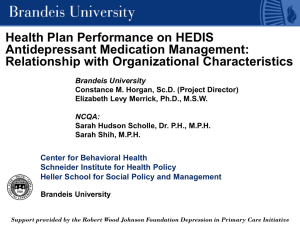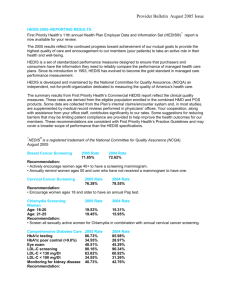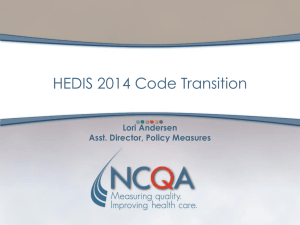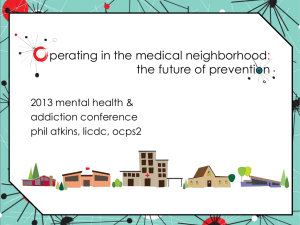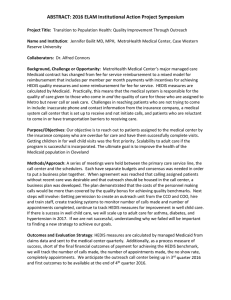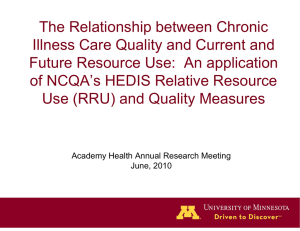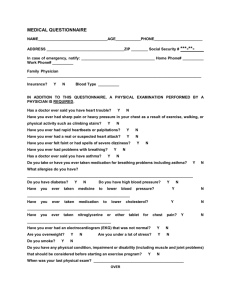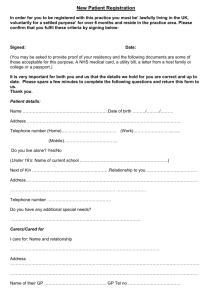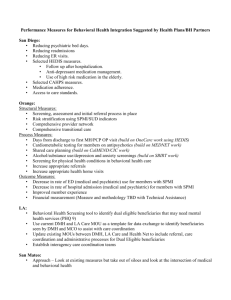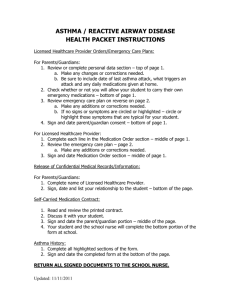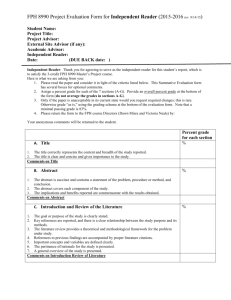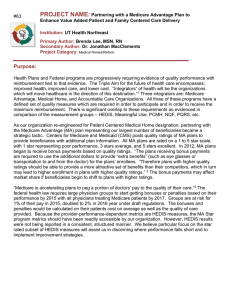2005 HEDIS Results Are In
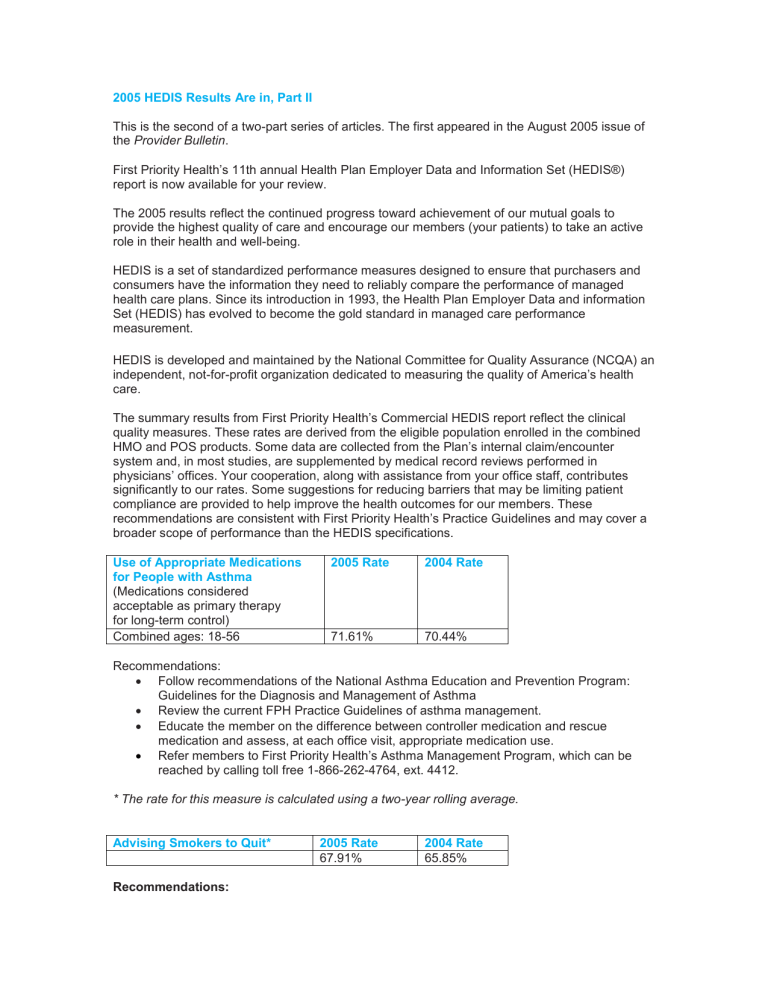
2005 HEDIS Results Are in, Part II
This is the second of a two-part series of articles. The first appeared in the August 2005 issue of the Provider Bulletin .
First Priority Health’s 11th annual Health Plan Employer Data and Information Set (HEDIS®) report is now available for your review.
The 2005 results reflect the continued progress toward achievement of our mutual goals to provide the highest quality of care and encourage our members (your patients) to take an active role in their health and well-being.
HEDIS is a set of standardized performance measures designed to ensure that purchasers and consumers have the information they need to reliably compare the performance of managed health care plans. Since its introduction in 1993, the Health Plan Employer Data and information
Set (HEDIS) has evolved to become the gold standard in managed care performance measurement.
HEDIS is developed and maintained by the National Committee for Quality Assurance (NCQA) an independent, not-for-profit organization ded icated to measuring the quality of America’s health care.
The summary results from First Priority Health’s Commercial HEDIS report reflect the clinical quality measures. These rates are derived from the eligible population enrolled in the combined
HMO and POS products. Some data are collected from the Plan’s internal claim/encounter system and, in most studies, are supplemented by medical record reviews performed in physicians’ offices. Your cooperation, along with assistance from your office staff, contributes significantly to our rates. Some suggestions for reducing barriers that may be limiting patient compliance are provided to help improve the health outcomes for our members. These recommendations are consistent with First Priority Health’s Practice Guidelines and may cover a broader scope of performance than the HEDIS specifications.
Use of Appropriate Medications 2005 Rate 2004 Rate for People with Asthma
(Medications considered acceptable as primary therapy for long-term control)
Combined ages: 18-56 71.61% 70.44%
Recommendations:
Follow recommendations of the National Asthma Education and Prevention Program:
Guidelines for the Diagnosis and Management of Asthma
Review the current FPH Practice Guidelines of asthma management.
Educate the member on the difference between controller medication and rescue medication and assess, at each office visit, appropriate medication use.
Refer members to First Priority Health’s Asthma Management Program, which can be reached by calling toll free 1-866-262-4764, ext. 4412.
* The rate for this measure is calculated using a two-year rolling average.
Advising Smokers to Quit* 2005 Rate 2004 Rate
Recommendations:
67.91% 65.85%
Use the “5 As” to discuss smoking cessation with your patients who smoke: ask, advise, assess, assist, and arrange.
Review FPH’s current Practice Guideline on providing medical assistance with smoking cessation.
Refer members to FPH’s Smoking Cessation Program, which can be reached by calling toll free 1-866-262-4764, ext. 4455.
Follow-up After Hospitalization for Mental Illness
2005 Rate 2004 Rate
Within seven days after discharge:
Within 30 days after discharge:
40.93%
67.62%
39.00%
68.62%
1 HEDIS
®
is a registered trademark of the National Committee for Quality Assurance (NCQA).
Recommendations:
Remind patients that a referral is not needed to obtain behavioral health services.
Prior to discharging patients from an inpatient psychiatric hospital, schedule their outpatient follow-up care visit with a behavioral health provider to take place within seven days.
Coordinate behavioral health care through the Regional Referral Center at 1-800-599-
2428. This service is available 24 hours a day, seven days a week.
Refer members who have been hospitalized with depression to FPH’s Depression
Management Program, which can be reached by calling toll free 1-866-262-4764, ext.
4428.
Antidepressant Medication
Management
2005 Rate 2004 Rate
(Patients with new episode of depression)
Three provider contacts within three months of diagnosis:
16.22% 18.74%
Three months of antidepressant therapy:
Six months of antidepressant therapy:
58.33%
40.99%
59.58%
43.79%
Recommendations:
Follow up with your patient at least once in the first three months of treatment to evaluate patient response to antidepressant medication.
Monitor patients diagnosed with a new episode of depression three times during the first three months of treatment.
Use a mental health diagnosis code for follow-up visits for depression or medication management.
Stress the importance of follow-up care and staying on prescribed medication for at least six months.
Refer members to FPH’s Depression Management Program, which can be reached by calling toll free 1-866-262-4764, ext. 4428.
Appropriate Treatment for
Children with Upper
2005 Rate
76.84%
Respiratory Infection (URI)
Recommendations:
Do not prescribe antibiotics for a diagnosis of URI.
2004 Rate
77.37%
Educate parents on the importance of reducing inappropriate antibiotic use.
Appropriate Treatment for
Children with Pharyngitis
2005 Rate
55.51%
2004 Rate
60.13%
Recommendations:
Administer a group A streptococcus (strep) test to validate a diagnosis of pharyngitis.
Prescribe antibiotics, as appropriate, for a positive strep test result.
In order to reduce the overall HEDIS reporting burden and allow managed care organizations to allocate resources to improvement activities, NCQA allows certain measures to be rotated on a biennial basis. The measures listed below were rotated by FPH in 2005; they will be evaluated again in 2006: Childhood Immunization Status, Adolescent Immunization Status, Beta Blocker
Treatment after a Heart Attack, and Cholesterol Management after Acute Cardiovascular Event.
HEDIS rates reflect the relationship among our network providers and our Plan working together to improve the health of our members. If you or your office staff have questions or comments about HEDIS, or recommendations to help increase the number of members receiving the appropriate care and screenings, please feel free to contact any of the following staff members of the HEDIS Department at First Priority Health: Rosanne O’Boyle (570) 200-4611, Cathy Branley
(570) 200-4616, Carol Bender (570) 200-4659, or Linda Emershaw (570) 200-4615.
